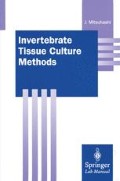Abstract
Cultured invertebrate cells may be useful in drug toxicity tests, because most invertebrate cell lines are easy to maintain. Unlike mammalian cells, invertebrate cells can be cultured at lower and over a relatively wider range of temperatures, and do not require a CO2 incubator. Most insect cell lines do not adhere to a substrate, and subculture is very easy. These characteristics of invertebrate cell culture give some advantage to the use of invertebrate cells over mammalian cells in drug toxicity tests.
Access this chapter
Tax calculation will be finalised at checkout
Purchases are for personal use only
Author information
Authors and Affiliations
Rights and permissions
Copyright information
© 2002 Springer Japan
About this chapter
Cite this chapter
Mitsuhashi, J. (2002). Examination of Drug Effects. In: Invertebrate Tissue Culture Methods. Springer Lab Manual. Springer, Tokyo. https://doi.org/10.1007/978-4-431-67875-5_39
Download citation
DOI: https://doi.org/10.1007/978-4-431-67875-5_39
Publisher Name: Springer, Tokyo
Print ISBN: 978-4-431-70313-6
Online ISBN: 978-4-431-67875-5
eBook Packages: Springer Book Archive

